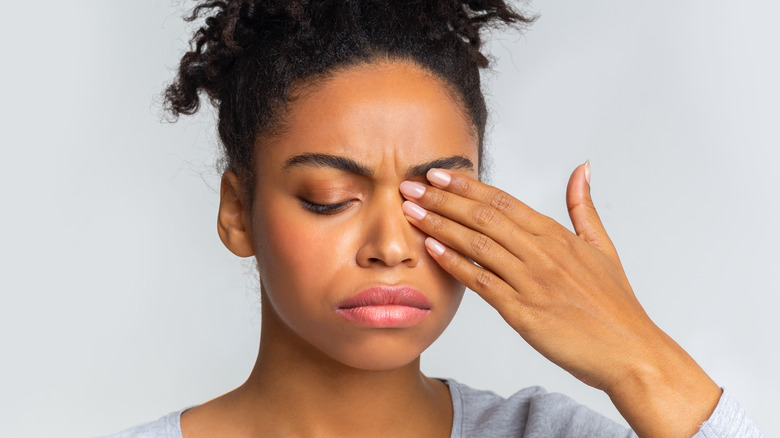What It Really Means When Your Face Feels Numb
At one point or another, you have probably experienced the sensation of your arm or leg going numb or falling asleep. But what about your face? Thankfully, occasional facial numbness isn't usually a cause for concern, according to Healthline.
Something as simple as falling asleep in a way that restricts blood flow could be the reason why you are experiencing a numb feeling in your face (per WebMD). Facial numbness may also be a result of certain medications you're taking (via Healthline).
Although most cases of facial numbness will resolve, there are certain situations in which immediate medical attention is warranted, according to Medical News Today. See a doctor as soon as possible if your face feels numb and you have a severe headache, difficulty speaking, vertigo, or slurred speech, advised the Mayo Clinic. All of these symptoms could be the result of a stroke or other serious medical condition.
Causes of facial numbness
According to Healthline, allergies can cause your face to feel numb, thanks to something you've eaten, in the case of a food allergy, or if you've had direct contact with an allergen like poison oak or poison ivy. While mild allergies are not always a cause for immediate attention, facial numbness coupled with difficulty breathing can be a sign that you're experiencing anaphylaxis, which requires immediate medical intervention (via Healthfully).
If you've recently had an infection, this could be another reason why your face feels numb, according to Healthline. One viral infection, in particular, that can cause this is Bell's palsy. In addition to facial numbness, symptoms of Bell's palsy include either weakness or total paralysis of the muscles in one side of the face, according to the National Institute of Neurological Disorders and Stroke (NINDS).
Bell's palsy has been linked to viruses that cause cold sores, shingles, the flu, and others (via Mayo Clinic). While rare, another respiratory disease that has been linked to Bell's palsy is COVID-19. A 2021 JAMA Otolaryngology–Head & Neck Surgery study found that a very small number of patients who contracted COVID-19 experienced Bell's palsy.
While facial numbness alone isn't necessarily a reason for alarm, it's a good idea to keep track of how often it occurs along with any additional symptoms you're experiencing so you can share it with your doctor. And remember, if you are experiencing any severe symptoms alongside your numbness, be sure to seek immediate help.


